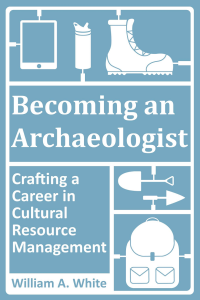 I had no idea that my discussion of drinking culture among archaeologists would lead me to write over 5,000 words of blog posts. This is the third post in a series on how binge drinking among archaeologists is both a benefit and a shortcoming. In Part I, I talked about how our tendency to binge drink wasn’t exactly a good thing. Part II focused on the social benefits while acknowledging the negative effects. In this third post, I elucidate seven tips we can all use to maintain our tradition without going out of bounds and harming our professional identity.
I had no idea that my discussion of drinking culture among archaeologists would lead me to write over 5,000 words of blog posts. This is the third post in a series on how binge drinking among archaeologists is both a benefit and a shortcoming. In Part I, I talked about how our tendency to binge drink wasn’t exactly a good thing. Part II focused on the social benefits while acknowledging the negative effects. In this third post, I elucidate seven tips we can all use to maintain our tradition without going out of bounds and harming our professional identity.
Enlightenment comes from talking and thinking about our drinking habits
In these blog posts and the conversations I had with other archaeologists in person and over social media, I realized some of us are taking our drinking to abysmal depths. I am a drinker that has been known to binge drink at archaeology conferences. Occasionally, I’ve also binged while out in the field. I am also guilty of strongly associating alcohol with fieldwork and conferences. I drink more than normal at these functions because I do not drink alcohol everyday. It’s kind of hard to find a drinking partner when you spend most of your time being a husband, dad, and graduate student. A beer after putting the kids to sleep every other day seems to be enough for me on a regular basis. Likewise, a beer after a hard day of fieldwork is sufficient. It’s been a long time since I binged after a regular day of archaeology fieldwork but it still occasionally happens.
I don’t think we need to eliminate alcohol from our work culture because of its strong power for social bonding and connection. Social drinking is important for archaeologists. We work hard and rarely receive recognition for our efforts. The least we can do is hang out with our peers and communicate together about the job we all enjoy.
During the course of this conversation, I have been enlightened on a number of things related to the drinking behavior of archaeologists. It is important and positive. But, our habits are not benign. Harm has been caused by the way we binge whenever we all get together.
Here are some things we can do in the future to stay on the positive side of social drinking without venturing to the negative, potentially illegal and career-destroying side:
1) Be mindful. We all need to pay attention to how much we are drinking and what that might be doing to our bodies and our relationships with other archaeologists.
2) Be honest. We need to honestly think about what our binging is doing to our bodies, our careers, and our potential.
3) Stay within your limits. Going beyond what you can handle has the potential to do damage. Know yourself and don’t get sh*t faced.
4) Remain respectful. Binge drinking isn’t part of archaeology. It’s a behavior we have normalized but we don’t all have to drink. Respect the decisions of other people. Don’t be a peer pressuring a**hole. Also, don’t do anything others would think is bigoted, sexist, racist, chauvinistic, or discriminatory in any way. Being drunk is no excuse for discrimination. Remember, you are drinking with other professionals that happen to be your friend. In the field, you are never “off.” There is never a time when you are not working while out in the field, so know your behavior could be grounds for dismissal or prosecution even if you are not technically “on the clock.”
5) Don’t break the law. Sexual harassment and assault is against the law. So is driving under the influence and providing alcohol to minors. Social drinking isn’t worth breaking the law over.
6) Stay professional. This is pretty much the most important tip. If we want to be respected as professionals, academicians, and scholars, we cannot get destroyed on alcohol at every conference and every evening in the field. I heard another archaeologist remark that, at a conference where the archaeologists drank the hotel bar dry, the bartender said we were worse than carneys (i.e. carnival workers). Did you spend tens of thousands of dollars on a college degree for non-archaeologists to think you behave worse than itinerate carnival laborers? (no offense to all the carneys out there that are reading this blog post)
7) What happens in the field follows us home. This is also important to remember. That adage “What happens in the field, stays in the field” is false. People remember what you did in the field. They remember your actions, statements, and how you carried yourself. All those field stories about drinking and partying after work will exist long after the project has ceased. So will the way you inappropriately touched a co-worker or made insensitive sexist comments.
Social drinking is important to cultural resource management archaeological social bonding, networking, and collaboration. Our relationships include letting off some steam over drinks. This is where some important work is conducted, despite the fact we have other avenues to interact. A majority of archaeologists understand the importance of social drinking and have appropriately integrated it into their professional interactions. Unfortunately, some of us have been going overboard. We also have done little to include non-drinkers into these interactions.
I believe we can do more to be inclusive of non-drinkers by staying professional, not going beyond our personal tolerance limits, and not forcing people to drink more than they’d like to. I don’t think we need to stop drinking all together; I’ve done it before and it actually stunted my interactions with other archaeologists. Rather, we need to adopt a middle ground where we responsibly drink together while staying mindful of the fact that our interactions at the bar may be alienating some of our peers.
Feel free to keep the conversation going. Please, write a comment below or send me an email.
 Having trouble finding work in cultural resource management archaeology? Still blindly mailing out resumes and waiting for a response? Has your archaeology career plateaued and you don’t know what to do about it? Download a copy of the new book “Becoming an Archaeologist: Crafting a Career in Cultural Resource Management” Click here to learn more.
Having trouble finding work in cultural resource management archaeology? Still blindly mailing out resumes and waiting for a response? Has your archaeology career plateaued and you don’t know what to do about it? Download a copy of the new book “Becoming an Archaeologist: Crafting a Career in Cultural Resource Management” Click here to learn more.
Check out Succinct Research’s contribution to Blogging Archaeology. Full of amazing information about how blogging is revolutionizing archaeology publishing. For a limited time you can GRAB A COPY FOR FREE!!!! Click Here
 “Resume-Writing for Archaeologists” is now available on Amazon.com. Click Here and get detailed instructions on how you can land a job in CRM archaeology today!
“Resume-Writing for Archaeologists” is now available on Amazon.com. Click Here and get detailed instructions on how you can land a job in CRM archaeology today!
 Small Archaeology Project Management is now on the Kindle Store. Over 300 copies were sold in the first month! Click Here and see what the buzz is all about.
Small Archaeology Project Management is now on the Kindle Store. Over 300 copies were sold in the first month! Click Here and see what the buzz is all about.
Join the Succinct Research email list and receive additional information on the CRM and heritage conservation field.
Get killer information about the CRM archaeology industry and historic preservation.



